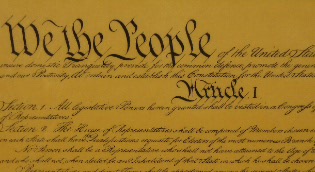Adam Theo–Flickr Creative Commons
[Comment]
Frederick Douglass wanted to give the world his opinion of the 4th of July celebration and what it means to the oppressed. Douglass asked: “Are the great principles of political freedom and of natural justice, embodied in that Declaration of Independence, extended to us?”
http://www.freemaninstitute.com/douglass.htm
That was about 150 years ago and it is legitimate to ask what does the constitution mean to Blacks in the U.S?
Well let us consider who wrote it and for whom. Tbe authors declared that enslaved Black people were to be counted as three-fifths (Article I, Section 2, of the U.S. Constitution of 1787) of the number of White inhabitants of that state.
So it probably doesn’t mean a lot for those who were not considered full human beings. The authors either owned enslaved Africans or did big business with those who enslaved Africans.
After devising the law of of the land it was decided to include individual rights and freedoms known as the Bill of Rights. If the main document doesn’t apply to us then maybe the first 10 Amendments do.
Well let’s see. What about the 13th Amendment?: “Neither slavery nor involuntary servitude, except as a punishment for crime whereof the party shall have been duly convicted, shall exist within the United States, or any place subject to their jurisdiction.”
Yet, mass incarceration amounts to continuation of enslavement of Blacks. Black people are about 14% of the national population but 37% of the nation’s 2.5 million prison population.
What about the Fifteenth Amendment or the right to vote? It is still the written law but today there is something called voter suppression which more accurately should be called Negro suppression because the voters to be suppressed tend to be almost exclusively Blacks who intend to vote Democratic.
What about the Fourth Amendment which protects against unlawful seizures, searches and arrests? That amendment doesn’t apply in our communities as everyone knows.
Well what about the Fourteenth amendment which provides for equal protection of the laws? Determining the applicability of any of these amendments to us could go on and on but the facts speak for themselves.
So before Black people bar-b-que hot dogs celebrating the colonists’ successful separation from England let us dare to think about our reality today.








